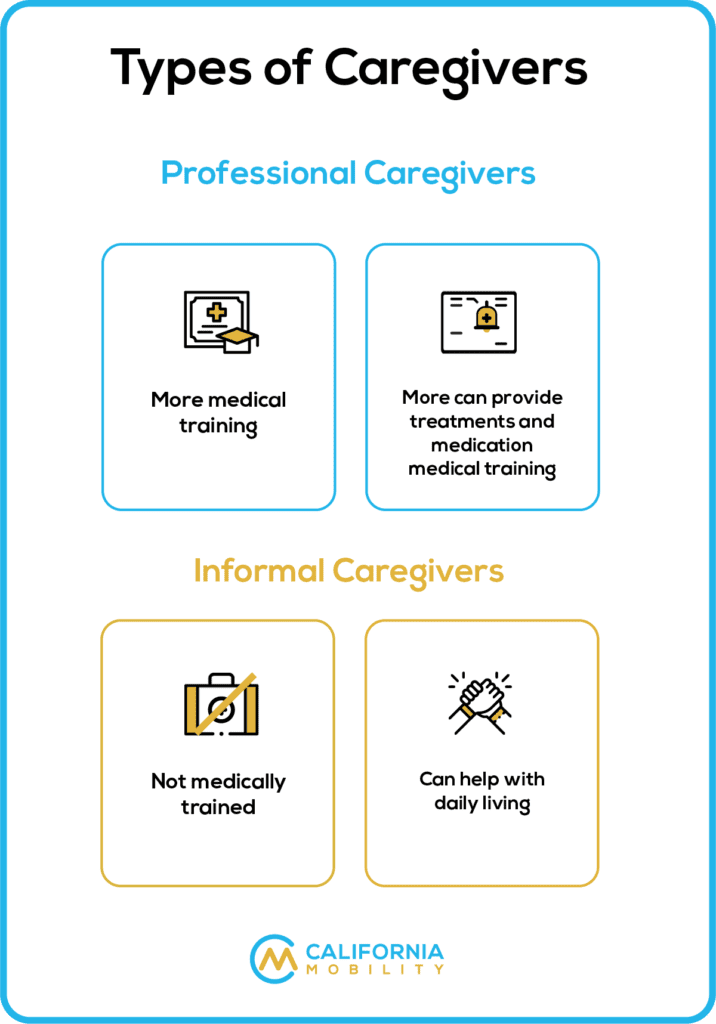Caregiving: A Complete Guide

Table of Contents
Millions of people across the country are caregiving for their loved ones. In fact, there are roughly 39.8 million caregivers in America alone.
So today, we’re going to talk about caregiving for senior citizens. We’ll give tips on what a caregiver is, the best qualifications for the job, and how to pick your ideal caregiver with ease.
Key Takeaways
- Caregivers come in two types: professional and informal. Professionals are paid to care for someone, while informal caregivers are friends or family members who do it out of love and duty.
- A caregiver should have a bare minimum of relevant experience, training, and communication skills.
- You can pay for caregivers with Medicare or personal assets to help with costs.
What Is a Caregiver?
A caregiver is someone who provides care for another individual who needs help taking care of themselves. This can be a paid position, such as a nurse or home health aide. Or it can be an unpaid position, such as with a family member or friend. Anyone who provides care for a senior citizen is considered a caregiver.
Types of Caregivers

There are two types of caregivers: professional caregivers and informal caregivers. Informal caregivers take care of their elderly loved ones without getting paid, while professional caregivers work in a personal home, nursing home, or other facility and get paid to care for older adults.
- Professional caregivers, like nurses, generally have more medical training and can provide treatments and medication. They can also help seniors with basic needs such as bathing, dressing, and grooming.
- Informal caregivers are not medically trained and are less adept at providing treatments or medication. But they can help with activities of daily living like running errands, preparing meals, and providing companionship.
What Should You Look Out for in a Caregiver?
Experience
Look for caregivers who have experience caring for seniors. This will give you an idea of their capabilities and ensure they meet your needs. This is especially important if you’re looking for a professional caregiver. A family caregiver typically has this experience already as they’ve known and cared for these family members in the first place.
Training/Certification
Some caregivers may have training or certification in caring for seniors. This is not required, but it may give you peace of mind knowing that your caregiver has the skills and knowledge to care for your loved one.
Insured Caregiver (With a Home Care Agency)
You’ll want to make sure that your professional caregiver is insured. This protects you in case of accidents or injuries while caring for a loved one. Often, a home care agency will insure their caregivers and provide them with resources and support to help them perform better.
Vaccinations
Many caregivers will have vaccinations, such as the flu shot. This is important because it helps to protect your loved one from getting sick. And it also helps to protect the caregiver from getting ill and passing it on to your loved one.
Communication
Caregivers must have good communication skills. This will allow them to communicate effectively with you and your loved one. They should be able to understand your loved one’s needs and communicate those needs to you.
Dependability and Trust
You’ll want to make sure that your caregiver is dependable and trustworthy. This means they’ll show up on time and be there when they say they will. They should also be someone you can trust to care for your loved one in your absence.
How Can I Finance a Caregiver?
Medicare

According to Medicare, they will fund a caregiver under the following conditions:
- The person is receiving medical care from a doctor;
- The person is medically certified as homebound; and
- The care provided is detailed and reviewed by the doctor regularly.
Basically, you’ll need a doctor who certifies that your loved one needs care and that the care provided is medically necessary. Once this is done, Medicare will help to cover the costs.
Tapping Into Your Assets
Many people choose to tap into their assets to finance a caregiver. This could include using their home equity, taking out a loan, or using money from their retirement account.
Using Home Equity
One option is to use home equity to finance a caregiver. Home equity is the value of your home minus the amount you still owe on your mortgage. It’s possible to borrow against this equity to pay for healthcare costs, home repairs, or in this case, a caregiver.
Taking Out a Loan
Another option is to take out a loan. This could be a personal loan or a loan from a bank or other lending institution. The advantage of taking out a loan is that you may get a lower interest rate than you would if you used your home equity. Shopping around for the best deal when taking out a loan is essential.
Using Retirement Funds
Another option is to use money from your retirement fund to finance a caregiver. In fact, 1 in 5 Americans have used retirement funds to do this. This includes withdrawing money from your 401k or IRA account. While this may seem easy, it’s important to remember that you’ll be sacrificing your retirement funds to pay for the caregiver now.
Aid From Drug Companies
Many people with chronic illnesses turn to drug companies for financial assistance with their medications. Drug companies offer a variety of assistance programs, including patient assistance programs (PAPs) and co-pay assistance programs. You can learn more about these programs by visiting the websites of drug companies or contacting your doctor.
Who Can Be a Caregiver?
Family Members and Friends As Caregivers
If you have a family member or friend willing to be a caregiver, that’s great. Family members are often the first to become caregivers out of a sense of love and obligation. Since they’re already familiar with you and your loved one, this can make the transition to caregiving easier.
However, it can be a lot of pressure on a family member or friend to provide care. This can lead to stress and conflict. Another con is that family relationships can be strained by the demands of caregiving. In fact, according to the National Alliance for Caregiving, 26% of family caregivers struggle to coordinate caregiving with their own life demands. So discussing with your family member or friend is crucial before they agree to be a caregiver.
It helps that some states pay family members to be caregivers. For example, CDPAP in New York State allows family members to get paid for being a caregiver. Other states include New Jersey, Washington, and California. If you’re interested in this option, check with your state’s health department to see if it’s available. You may be fairly compensated if you provide informal caregiving to a loved one.
Can Non-Citizens Serve As Caregivers?
For non-citizens, the answer is a little more complicated. While non-citizens can serve as caregivers, there are some restrictions. For example, they must have a green card or a work visa. If you’re a non-citizen and want to be a caregiver, you should contact an experienced immigration lawyer. They can help you navigate the process and comply with the law.
How Do I Find a Caregiver That’s Right for Me?
There are several considerations when choosing a caregiver. First, assess what type of care is required: Personal care, such as bathing and eating; household care, like cooking and cleaning; health care, like medication management; or emotional care in the form of companionship?
Depending on the patient’s needs, different caregivers will be more or less qualified. For example, a caregiver experienced in personal care may not be experienced in health care. Finding a caregiver who can meet all of the senior citizen’s needs is crucial.
The second consideration is choosing between a professional or informal caregiver. Professional caregivers are paid to provide care, while informal caregivers are not. Ultimately, whether to choose a professional or informal caregiver depends on the needs of the senior citizen, and the family’s preference.
A formal caregiver may be the best option if they need a lot of care and the family cannot provide it. Formal caregivers can provide care on a full-time or part-time basis. They can also provide live-in or hourly care.
On the other hand, if the senior citizen only needs a little care and the family can provide it, an informal caregiver may be the best option. Informal caregivers can be family members, friends, or neighbors. And, unlike formal caregivers, they are not paid to provide care.








